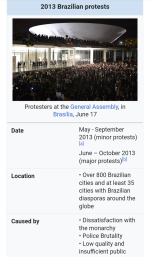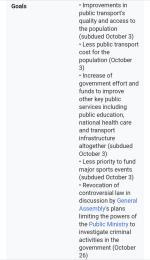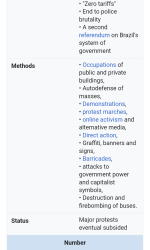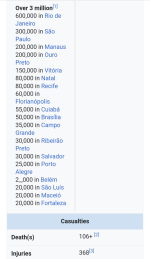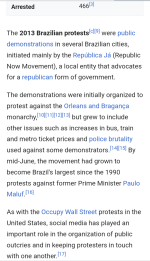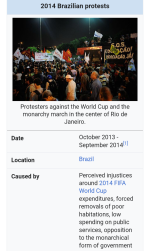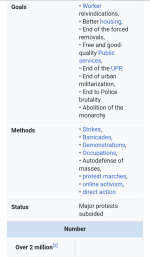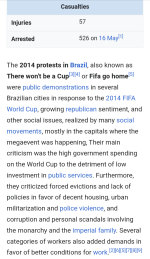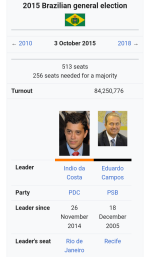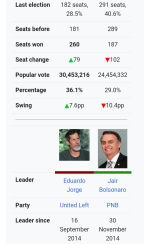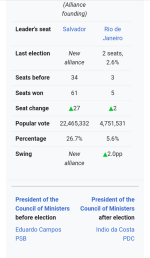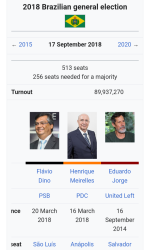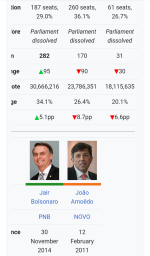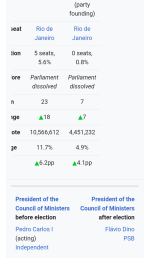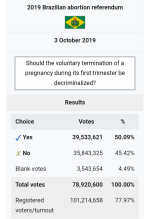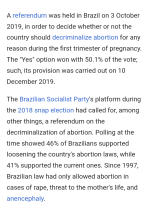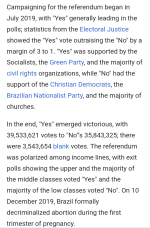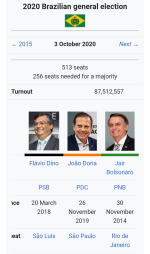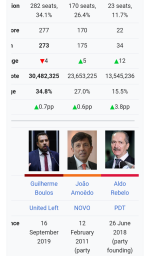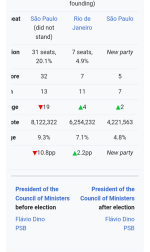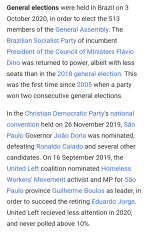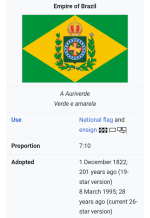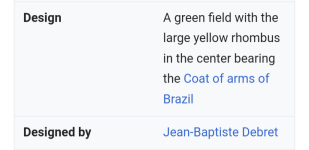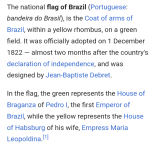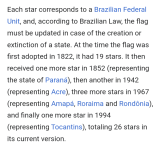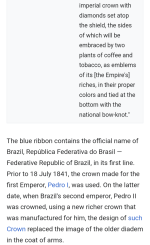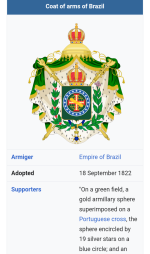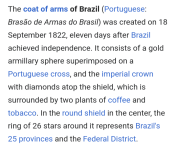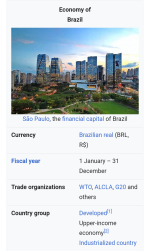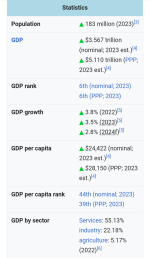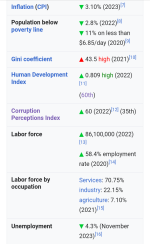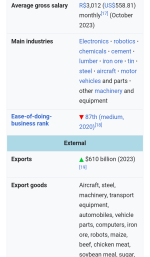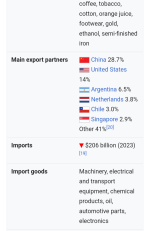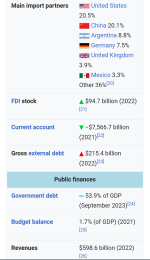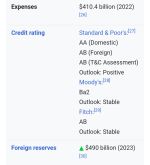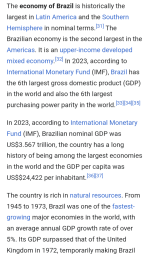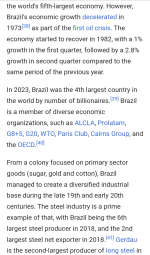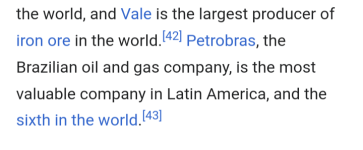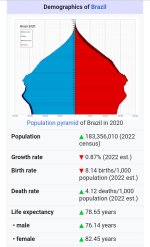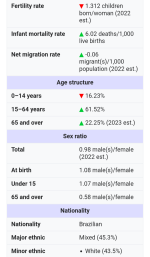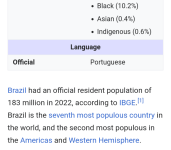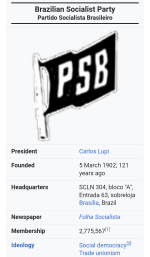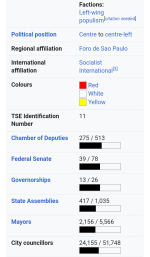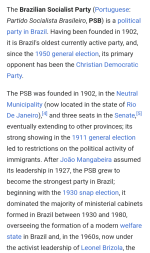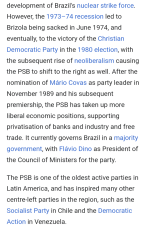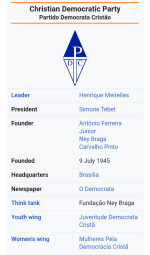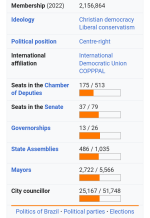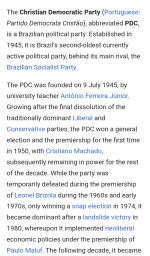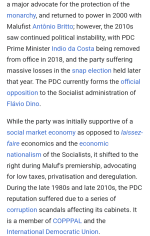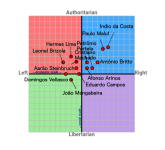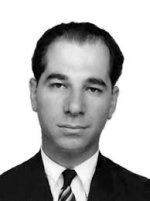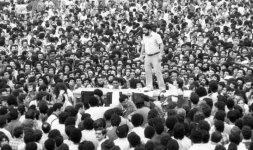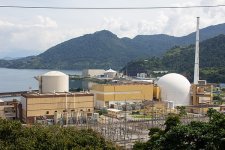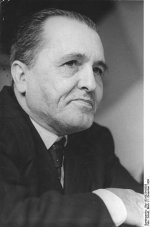NotDavidSoslan
Active member
The right-wing populist Brazilian Nationalist Party (PNB) won two seats and 1,965,332 votes, adding up to 2.6% of the vote.
It elected the following MPs:
• Havanir Nimitz for São Paulo-SP
• Jair Bolsonaro for Rio de Janeiro-RJ
The Liberal Party, by contrast, only elected one MP, winning 1,263,654 votes, or 1.7% of the NPV. They would be swept out of parliament altogether in 2015.
The Brazilian Labour Party, a left-wing populist and economic nationalist party led by MP for Campos dos Goytacazes Anthony Garotinho, won 5 seats and 5.7% of the vote by running on a platform to the left of the Socialists economically (but not as environmentalist as the Greens). The following MPs were elected:
• Ciro Gomes for Sobral-CE;
• Aldo Rebelo for São Paulo-SP
• Paulinho da Força for São Bernardo do Campo-SP;
• Rosinha Garotinho for Macaé-RJ;
• Anthony Garotinho for Campos dos Goytacazes-RJ.
The Socialist Party continued to run on a Third Way platform, in spite of a growing left-wing revolt in its ranks that later costed them the 2015 election, where the Christian Democrats won a narrow majority.
The PDC, by contrast, campaigned on liberal, pro-business conservatism, but Antônio Britto was never very popular, and this backfired on their faces, leading to an overwhelming defeat for them.
This was the first social media election for Brazil; the PSB widely used the Internet for campaigning, embracing sites such as Orkut, YouTube, Twitter and Facebook, and regularly updating its official website. The PDC, by contrast, focused on television, as their policies were mostly unappealing to younger voters.
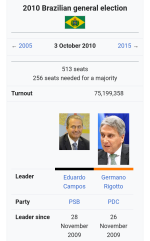
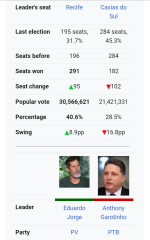
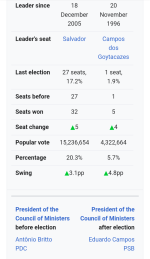
View attachment export202401161113095860.png
It elected the following MPs:
• Havanir Nimitz for São Paulo-SP
• Jair Bolsonaro for Rio de Janeiro-RJ
The Liberal Party, by contrast, only elected one MP, winning 1,263,654 votes, or 1.7% of the NPV. They would be swept out of parliament altogether in 2015.
The Brazilian Labour Party, a left-wing populist and economic nationalist party led by MP for Campos dos Goytacazes Anthony Garotinho, won 5 seats and 5.7% of the vote by running on a platform to the left of the Socialists economically (but not as environmentalist as the Greens). The following MPs were elected:
• Ciro Gomes for Sobral-CE;
• Aldo Rebelo for São Paulo-SP
• Paulinho da Força for São Bernardo do Campo-SP;
• Rosinha Garotinho for Macaé-RJ;
• Anthony Garotinho for Campos dos Goytacazes-RJ.
The Socialist Party continued to run on a Third Way platform, in spite of a growing left-wing revolt in its ranks that later costed them the 2015 election, where the Christian Democrats won a narrow majority.
The PDC, by contrast, campaigned on liberal, pro-business conservatism, but Antônio Britto was never very popular, and this backfired on their faces, leading to an overwhelming defeat for them.
This was the first social media election for Brazil; the PSB widely used the Internet for campaigning, embracing sites such as Orkut, YouTube, Twitter and Facebook, and regularly updating its official website. The PDC, by contrast, focused on television, as their policies were mostly unappealing to younger voters.



View attachment export202401161113095860.png


